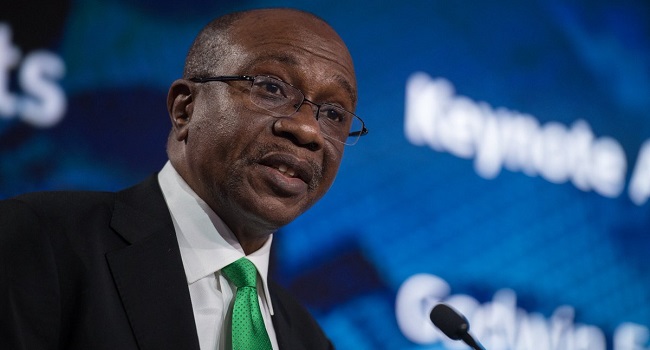Business
CBN levies banks N1.4trn in move to mop up liquidity, shore up Naira

The Central Bank of Nigeria (CBN) has collected N1.4 trillion ($3.9 billion) from banks in the country with excess cash holdings as part of strategies to support the Naira, banking sources told Reuters on Friday.
The Nigerian currency has been reaching unprecedented low levels since March after the CBN adopted a new official rate, which factored in a 15% devaluation as a buffer against the effects of oil price slump prompted by COVID-19.
This week, the Naira exchanged for as much as 420 to the dollar on the parallel market for the first time since February 2017, a figure 14% weaker than the official market rate.
On Friday, the dollar was quoted at N386.33 on the spot market.
“On the non-deliverable forward market, one-year dollar/naira forwards crossed 500 naira per dollar this week,” Reuters said.
In January, the CBN had ramped up the Cash Reserve Ratio, by 5% or 500 basis points to 27.5%, the first increase in four years, in an effort to mop up excess liquidity from the system and control inflation.
Bankers on Friday said the CRR debit exceeded 27.5%, adding that it had nothing to do with a sanction set for lenders that failed to meet a stipulated loan-to-deposit target.
According to CBN data, banking credit stood at N260.17 billion at Friday’s open, down from the N817.69 billion recorded at the previous session.
Read also: UN agency proposes $3.4tn debt write-off for Nigeria, others
Banks had been saturated with cash after the Nigerian government released N780.926 billion to states under a March budget payment on Wednesday.
At N355.95 billion, Zenith Bank was most affected by the higher debit among Nigeria’s 28 commercial and merchant banks.
It was followed by First Bank (N208.1 billion), United Bank for Africa (N204.75 billion), Standard Chartered Bank (N120.65 billion) and Stanbic IBTC (N143.97 billion).
The central bank deploys cash reserve levies as a tool for soaking up liquidity in the banking system and usually re-injects the liquidity to stabilise markets.
“It was not immediately clear the reason for the levy, especially at a time when lenders are dealing with the fallout of the new coronavirus on Africa’s biggest economy,” Reuters said.
According to the Nigeria Centre for Disease Control, the country’s coronavirus reported cases were 981 on Friday while the death toll stood at 31.
The CBN debit caused money market rates to balloon to 35% on Friday from just 2% the previous session.
Last October, the central bank levied a charge of over N400 billion on 12 banks for their failure to increase loans to meet a regulatory target.
At that time, the CBN ordered banks to maintain a minimum loan-to-deposit ratio or be subjected to a higher cash reserve levy as part of the strategies to get credit flowing.
Join the conversation
Support Ripples Nigeria, hold up solutions journalism
Balanced, fearless journalism driven by data comes at huge financial costs.
As a media platform, we hold leadership accountable and will not trade the right to press freedom and free speech for a piece of cake.
If you like what we do, and are ready to uphold solutions journalism, kindly donate to the Ripples Nigeria cause.
Your support would help to ensure that citizens and institutions continue to have free access to credible and reliable information for societal development.






















